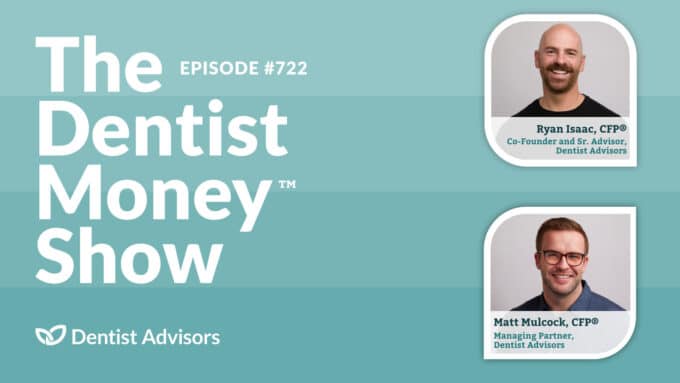TL;DR – Listen to the article post:
On average, people make nearly 35,000 decisions a day (Psychology Today). Between being a parent, partner, community member, practice owner, and dentist, the decisions never stop.
Take something as simple as laundry. It’s never just tossing clothes in the washer. It’s a string of microdecisions: What needs washing right now? Should colors and fabrics be separated? Are there stains to treat? Which detergent, how much, and on what cycle? And when does it all get folded and put away?
Household chores are only one example of how small choices pile up. Each microdecision chips away at your energy, and it’s easy to see why so many people feel mentally and emotionally exhausted. For dental entrepreneurs, the load doubles—treating patients, running a practice, handling payroll, managing loans, and trying to keep up with endless emails. Just like laundry piling up, these decisions add weight over time and quietly lead to emotional burnout.
And when financial stress gets layered on—student debt, fluctuating income, or uncertainty about retirement—the mental drain only deepens. This is where decision fatigue and emotional exhaustion can easily spill into financial burnout.
Why Financial Burnout Happens
Dental practice owners often face financial burnout, largely due to the enormous debt they carry. The average dental student graduates with over $300,000 in student loan debt (ADEA, 2024). In addition, purchasing an existing dental practice can cost between $500,000 and $750,000 (Curve Dental). Combined, many dentists start their careers owing more than a million dollars. By comparison, the typical American household carries around $105,000 in debt (Business Insider).
Financial burden is only part of the story. The invisible, ongoing responsibilities that come from juggling multiple roles and meeting high expectations both at work and at home only add to the burden.
Dentists are expected to be real estate professionals, CEOs, and healthcare providers—all skills that are not taught in dental school. Managing these responsibilities at once creates a constant mental load, leaving you drained and restless. It also makes long-term planning difficult because short-term financial pressures push you to make quick decisions that may not align with bigger goals.
Inconsistent cash flow from the business adds to the challenge. At home, budgeting for bills, savings, or major life decisions can feel like guessing. In practice, fluctuating patient counts and case acceptance create similar uncertainty. Deciding when to invest in equipment, staff, or continuing education can feel risky, and tracking income, deductions, and bookkeeping often consumes time that could be spent on patient care.
Carrying both financial and emotional loads affects emotional and physical well-being. It can lead to anxiety, uncertainty, depression, and self-esteem issues. I often hear how the emotional burden brings on sleepless nights. Ultimately, burnout takes away time and energy from the things that really matter, like moments with family and friends.
Strategies to Reduce Financial Burnout
Have a Buffer
Having an emergency fund is one of the simplest yet most powerful ways to reduce daily stress and decision fatigue. Without a financial buffer, every slow month or unexpected expense can feel like a crisis, triggering reactive choices that may not serve you long-term.
A healthy buffer breaks the debt cycle by reducing reliance on credit cards or loans during lean periods. It protects your goals and gives you flexibility. You can say no to a bad partnership or difficult patients because you are not operating from financial desperation. A strong emergency fund typically covers three to six months of personal expenses and one to two months of business operating expenses, kept in an accessible, low-risk account such as a high-yield savings account.
Have a system that works for you
Many people assume there is a “right” way to handle finances, but a financial system should be tailored to your lifestyle, preferences, and goals. What works for one person may feel overwhelming or inefficient for another.
Consider two clients who are equal 50/50 partners in a dental practice. On paper, their finances are very similar, but their financial plans could not be more different because their goals and preferences vary widely. Personalized planning is crucial for avoiding burnout and building a system that actually works for you.
It is better to have a simple, consistent process you can maintain than a complicated system that feels impossible to keep up with. Automating key parts of your finances, such as savings, bill payments, and investments, removes the mental burden of remembering every detail. Start small by automating one bill or savings goal first. Use technology that fits your comfort level, keep a dedicated folder for important documents, and set up alerts for due dates or low balances.
Protect Your Future
Beyond day-to-day management, long-term planning plays a critical role in reducing stress and protecting your future. One of the questions I hear most often from dentists is, “Am I on track to retire?” Knowing you are on track gives you the power of choice, which can reduce stress and free mental energy for the present.
The earlier you start planning and saving, the more you benefit from the compounding effect of investing, which is when your money earns interest on both your contributions and the interest it has already earned. Confidence in your retirement plan allows you to focus on what matters most, including your work, relationships, and hobbies.
While retirement planning addresses long-term goals, insurance planning provides an important layer of protection against unexpected risks. Dentists face unique risks such as injury, illness, or even a broken hand that could disrupt a practice. Many assume disability insurance is unnecessary, but one in four dental professionals will rely on it at some point. Knowing your income is protected, whether short-term or long-term, can greatly reduce stress and help you feel secure about the future.
Delegating to a Professional
Delegating can feel challenging for those who enjoy being actively involved in many aspects of their work and personal life, but it is one of the most powerful ways to reclaim time and energy. A helpful mindset is to focus on doing only the things that only you can do, and allow others to take on the rest. The time you invest in training someone on the smaller tasks you normally handle will pay off many times over, freeing you to spend more time on what matters most.
I used to think doing everything myself made me stronger and more successful. Now I realize that those who delegate gain something even more valuable: time. We cannot be experts in parenting, travel, accounting, business, dentistry, and friendships all at once.
Delegating may feel uncomfortable at first, but the benefits far outweigh the discomfort. Bringing in an expert frees your time and energy, reduces stress, and allows you to focus on what you truly enjoy. You do not need to delegate everything, but if something is time-consuming, confusing, or not sparking joy, consider letting someone else handle it. This can include CPAs, wealth advisors, practice consultants, travel consultants, or therapists. Be intentional about what you spend your time on and delegate what serves your life better.
Putting it All Together
Financial burnout is real, but it doesn’t have to define your career or life. By creating a financial buffer, building a system that works for you, planning for the future, and leaning on others when needed, you can reclaim your energy, reduce stress, and focus on what truly matters.
Managing a dental practice and a personal life is a complex job, and carrying both financial and emotional debt can be exhausting. Taking steps to intentionally protect your time, income, and mental health can give you the freedom to make choices rather than react to circumstances.
Small, consistent actions like saving, automating, delegating, and planning compound over time, just like your retirement savings. The sooner you start, the more control you’ll have over your future, giving you more mental energy to free up for your patients, your family, and yourself.
Financial planning is not just about numbers; it’s about giving yourself the space to breathe and the power to choose to give yourself confidence to live your life on your terms. By prioritizing your finances and well-being, you can reduce burnout and enjoy the rewards of your hard work, and thrive as a dental professional and in all the roles that matter the most to you.




